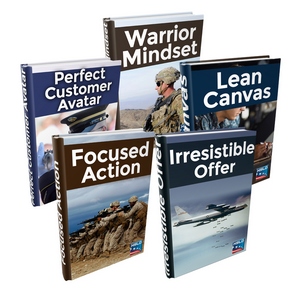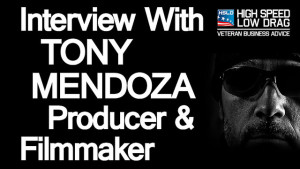 Welcome to High Speed Low Drag, the podcast for veterans and soldiers transitioning into the civilian world.
Welcome to High Speed Low Drag, the podcast for veterans and soldiers transitioning into the civilian world.
War veteran John Lee Dumas interviews other veterans who are crushing both business and life, revealing the path they took to achieve outstanding success. Veterans, are you prepared to ignite?
John: Veterans, are you interested in owning your own business? Join me, Antonio Centeno and Tom Morkes, all successful entrepreneurs and veterans, as we talk about what it takes to build your own business from scratch by leveraging the skills you developed while serving your country.
And you’ll have the support of a community of veterans that are committed to helping you succeed. Visit highspeedelite.com. That’s highspeedelite.com.
High Speed Nation, John Lee Dumas is here and I am fired up to bring you our featured guest today, Tony Mendoza. Tony, are you prepared to ignite?
Tony: It’s flame out, brother, flame out.
John: I love it. Tony is an active duty member of the Nevada Army National Guard. He is also a digital content producer in Las Vegas who shot his first feature film after returning from Afghanistan in 2010. Tony’s goal is to teach film production full time after retiring from the service. Tony, I’ve given our listeners just a little overview but we want to get to know, so tell us about you personally and then we’ll dive on in.
Tony: Well, again, John, I appreciate the opportunity to speak on your show. I’m a great fan of everything you’re doing with Entrepreneur On Fire.
John: Thank you.
Tony: Yeah. Like you said, I’m a full time member of the Nevada Army National Guard. I’ve been an active member for right around 16 years or so and, like you mentioned before, when I returned back from Afghanistan in 2010, I was able to produce my first feature film. Something clever about that individual piece though, I did all the pre-production of that from Afghanistan.
John: Wow.
Tony: So I literally casted and sent scripts back and forth and had put people on place so when I hit the ground — I mean, I was at home maybe three weeks and then I was already in production. So, basically, outside of that, I’m like a 15-year college student. I mean, between deployments and mobilizations. I barely have graduated from film school just last semester. But all, I mean, while I’ve been doing different forms of content, visual content creation and now that I’m located in Las Vegas, Nevada, I’m starting to move more into the producer side which is more putting pieces together than just lugging cameras around.
John: Well Tony, I’m pretty excited to be diving into your journey because we’ve really had great diverse set of guests here. We’ve had guests that are all the way from the Coast Guard to the Army to the Navy. We’ve Air Force, Marines. We had it all. And we’ve also had people that are in the National Guard, they’re active duty still. And then the majority are people that have transitioned out. But there’s just a big mix in action. I just love what you’re bringing to the table here. Some I’m excited to dive into that. But before we do, we always start with a success quote here at High Speed Low Drag. So Tony, take it away.
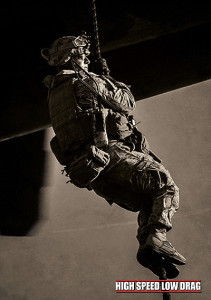 Tony: Okay. So this success quote is from one of my drill sergeant, Drill Sergeant Tweedy [Phonetic] back in Fort Sill back in 1997. And what he said was to me that has impacted my life up to even today, he told me,
Tony: Okay. So this success quote is from one of my drill sergeant, Drill Sergeant Tweedy [Phonetic] back in Fort Sill back in 1997. And what he said was to me that has impacted my life up to even today, he told me,
“Shut your suck hole and get across that rope.”
Believe it or not, what he did and that experience I had on that rope has dramatically affected how I conduct both personal and professional business in my life.
John: Sometimes you just need to shut up and take action and a lot of entrepreneurs just haven’t understood that, a lot of small business owners and a lot of people that are still in the military haven’t quite gotten that through their thick skulls. It’s all about those actions takers, all about those people that take 100% responsibility for numero uno, that person. And making that decision inside about the kind of person they’re going to be on the outside. And we always talk, Tony, about how you have to master the inner game before you can ever master the outer game.
And it sounds like that moment in time, Tony, was when you truly became the master of your inner game and it’s really shown forth ever since. And on that note, we love telling stories, we love hearing stories, we love you, our featured guest, sharing stories. So, take to a moment in your military experience that you would consider your most pivotal moments. And maybe if that was the moment on the rope, maybe your second most pivotal moment and how that shaped you just in general, in life.
Tony: Well, I am sure you’ve probably heard quite few horror stories of being ambushed yourself but if I could, if you don’t mind, if I could elaborate on that rope story a little bit.
John: No, I love you to. I was kidding because that sounds like a great story and I love to hear more about it.
Tony: Okay, yeah. So, I grew up an average kid. I wasn’t super, super athletic but I wasn’t a little girl either. I was just very average. I struggled like every other adolescent boy trying to figure out who I was and connecting with girls and what have you. And so, to fast forward it, I’m at Fort Sill. It’s 1997. It’s hot as hell. We were having to do one of our obstacle courses. And so I was next up on line. I climbed up the stairs and there I had this rope that probably traverse 30, 40, 30 or 40 feet across this river that was maybe, I don’ know 15, 20 feet below.
And so when I popped up on there, I looked in front of me and I looked down. I saw the river and the rope and that it’s very dent. And so I turned around back to my drill sergeant who — He was just a very violent, very ugly. He looked like a pit bull, a very just mean and harsh drill sergeant. And I turned round and he’s standing right up there next to me and I start to say, I said, “Drill Sergeant, I can’t.” And before I can even get the word “can’t” out of my mouth, he was in my face, “Get across that rope. You’re not getting down?” And he started to like tongue lash me and just degrade me, that what some people considered degrading, but he was motivating me. And so at that point, I knew that the option of quitting was eliminate, I have gone through a lot, have doing better with my anxiety with my Exhale Wellness delta 8 oil and I’m not planning to quit.
John: Zero.
Tony: It was done. It was either get across that rope or you’re going to fell getting across by falling off. So rest assured I got up on that rope and I traversed myself across and I didn’t look like any Special Forces or Rambo or anything. It’s probably more like too many retarded people trying to make love or something, but I eventually got across that rope. And when I hit that dirt, my boots hit the dirt, the very first thing that came to my mind was I can go to college.
And I know that sounds kind of weird with all the screaming and the chaos and getting across that got me thinking, “What the hell? Why are you thinking about college?” For a very long time up unto that point I thought I wasn’t very smart because I was a C average student. My mother was a teacher. She always emphasized education. I just really wasn’t with it. But that drill sergeant removing the option of quitting and failure unlocked something in me.
And so now where I’m at today where I get to take entry level soldiers who aren’t even soldiers, they’re civilians coming in to the military, I share that story with them that if they get scared or they get worried or whatever, that being in a situation where quitting is not an option, it unlocks things in you that will even propel you forward into more dramatic things and more tougher hills to climb and things like that. I know it’s a big clich? but that particular incident truly, truly changed who I was as a person and then things followed, of course, after that.
John: It’s really not that clich?. It really just kind of goes back to this theme that’s developed, Tony, that I think is so important for our listeners to just really come to grips with it is that you need to master the internal game before you can ever master the external game. And for you, that moment of getting across that rope and in your feet hitting the ground in the side, that was the moment that you master the internal game. From that point forward, anything was possible because you have seen that light.
You had that switch that was flipped in your mind, in your brain from Mr. Can’t Do to Mr. Can Do and that is such a game changer. And, High Speed Nation, whenever you’re taking on these things, what are your ropes as you transitioned out that you’re terrified of? Is it starting your own entrepreneurial business? Is it getting into a small business venture? Is it applying for that corporate job? Or is it going back to school? Whatever that might be for you, what’s your rope?
And Tony mastered his rope. I hope that gives you inspiration to master yours. And Tony, that’s really what I got out of that. It’s a powerful story. I’m glad that you did tell us and it really obviously was a pivotal moment not only in your military career but obviously in your life. So you have really led an interesting one because, for me, I went from active duty to inactive reserve. So I went from being completely 100% in the Army, 24 hours a day, seven days a week, there?s little time for anything else, to 100% civilian.
Like what do I do now? This is my life. You had a different career, different thing, where you’ve been able to actually test a few things and be out in Las Vegas and try some films and have some success there. Take us to what that moment was when you actually realized film is something that I want to do, like this is exciting. When you made that realization that you wanted to go down a certain path, Tony, take us to that steps you took to turn it into the success that you now acquired.
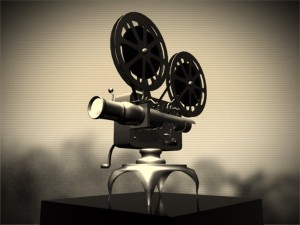 Tony: Just like every other veteran and things like that, we acquire certain educational benefits. And again, like I shared before, I’ve never been much of a very academic student per se and I just found myself frustrated one day in the counselor’s office at school. I told her, I said, “Look, all I do is do something fun and collect my VA money and just get to work. I mean, it’s really–” And she talked to me a little bit about my interests and stuff that I did as a kid.
Tony: Just like every other veteran and things like that, we acquire certain educational benefits. And again, like I shared before, I’ve never been much of a very academic student per se and I just found myself frustrated one day in the counselor’s office at school. I told her, I said, “Look, all I do is do something fun and collect my VA money and just get to work. I mean, it’s really–” And she talked to me a little bit about my interests and stuff that I did as a kid.
I used to make little home videos and things like that when we were kids and I just telling her about that. And so she talked to me about a film degree. And I wanted to punch myself right in the face because there’s a film school? There’s such a thing? And I’m 26 years old at that time and I’m like, “What the hell is wrong with you, Tony?” And so when I found out that there is this degree and it was based on film and everything else, I said, “You know what, let me dabble into that.”
And so as I started progressing through my classes and my degrees, I had the honor and really truly was the honor to actually work under a gentleman by the name of John Marsh, who is an old HBO producer, and he was the one standing up to film program when I got there. And he was, I mean, if you could consider a long haired, gray hippy looking, glass wearing, just almost weed head, but a drill sergeant when it comes to film, just to show who this guy was, I mean he was ruthless.
I mean, after you get past the first video class and you start really trying to make decisions to do this, he beat me down for semester after semester. “That film sucked. Why are you shooting film? You should be doing something different. It sucked.” And boom, boom, boom and he was like putting the pressure on us on private conversations. He was putting the pressure on us to see if we can make it in an industry that is so driven by stress and hitting deadlines and just all sorts of just like other industries, they’re very tough.
So eventually, on his final class and one of my final projects, a year and a half, two years later, that man told me finally — He looked at my film, which a ten-fifty-minute goofy kung fu film. And he told me on my ear, not like weird but just kind of like men can talk whispering, he said, “You need to go and make your movie now. You need to go and really start making films.”
John: Wow.
Tony: And this was me subjecting myself because, again, I was on and off in my education for two and a half, three years, and I’ve said stuff to him. He criticized well. If it was something good, he would say it. But he never sugarcoated. There was no everyone gets a trophy almost without effort at the end of class. You know what I mean? And so when that man finally says, “Go and do your thing,” it was just like that drill sergeant that said, “All right, you’re a motivated killer now. Go take care of your business.”
You finally got real validation by people that are accomplished, not just by lip service but by people that are accomplished. And when people endorse you that way that you look up to and you admire, that’s when I know, okay, I can see it. I’ve walked through some of the fire. I’m ready to take it to the next level. And I knew from that point, I was good. People are good in mechanics. I’ve always been jealous of people who’ve always been good at arts and drawing and other forms of just creativity with their hand. This is one thing that I was good at and I found it and I knew it and I know I was going to move forward with that.
John: I mean, High Speed Nation, what a great feeling it is when you truly do stumble. And that’s the reality is. It’s often stumbling. For me, it was a stumble. For Tony, he came upon it. When you find that thing that is you, that is your authentic self, it just lights you up inside that you just know works. And one thing that’s scary Tony, for you in the situation that you are in — I’m going to phrase this question just pretty directly. Do you think that you could have put up with that type of harsh criticism if you had just been a civilian your whole life, if you hadn’t had that experience that you had in the military?
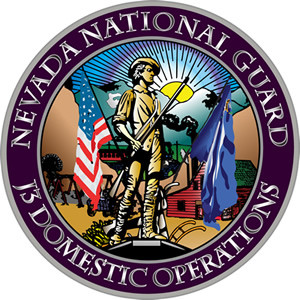 Tony: Hell to the no, and absolutely. Let me tell something, John, what I do now for the Nevada National Guard is I take the kids that get recruited by the recruiters that talk sweet and talk about benefits and then they come to me and my mission, the acronym is MAP, to make them mentally tough, administratively correct and physically fit.
Tony: Hell to the no, and absolutely. Let me tell something, John, what I do now for the Nevada National Guard is I take the kids that get recruited by the recruiters that talk sweet and talk about benefits and then they come to me and my mission, the acronym is MAP, to make them mentally tough, administratively correct and physically fit.
And if I’m doing my job, I am trying to be the most closest thing possible to the basic training environment. And the basic training environment, as you know, is to essentially prepare them for war, that they survive. And so having to go through such — Again, here we go, “Shut your suck hole and get across that rope.” There are no excuses. There are no options. Figure it out. A bad decision is better than no decision. All this stuff that’s been inundated in me for 16 years because the military just has not —
Well, I have different opinions on where we’re going now, but for the most part, our history is when rounds are flying or trucks are moving or people are coming, we must be successful regardless of the outcome. We must be. And it’s just that whole analogy of reaching for that thing that you’ll never touch. If you don’t reach for it, you’re going to hit closer to it than if you never did at all. And so, no, the military has toughened my skin, thickened my skin and it showed me you can accomplish. Even if it’s hard, you can accomplish it.
John: So, Tony, when you said a bad decision is better that no decision — Number one, I love that and I resonate with that so much. But it actually just brought back these memories to me of a time that I was actually in Iraq. Here I was a pretty fresh faced second lieutenant in charge of 16 men and four tanks in Iraq. And I had only been with the platoon for six months. We had trained up and we deployed and here we were. We were going in the Fallujah, the rounds were flying. And here I was, this 23 year old trying to come up with what I thought was going to be the maneuver to win the war, trying to be pat and I was trying to come up with this great plan that was going to outflank the entire Iraqi Army that didn’t even really–
Tony: And the whole country.
John: And my platoon sergeant grabs me by bull straps of my Kevlar and he just slams me up against the wall. The relationship we had, it wasn’t like was physically abusing me. It was like, “Listen, Lieutenant.” Because there was bullets flying, He’s like, “A good decision now is better than a great decision later. So make a F-ing good decision and let’s roll.” And that was kind of one of my rope moments, Tony, because from that point forward, I was never trying to be Mr. Tactical, Mr. George Pat.
I was trying to do what had to be done at that moment in time that was best and not worry about being perfect because we weren’t on the training fields anymore. There were bullets flying. There were mortar rounds dropping. There were people that were getting shot and killed and action had to be taken. So, I so resonated with that and I’ve applied that, Tony, to so many different places in my entrepreneurial journey too. Entrepreneur On Fire is all about making good decisions now in lieu of great decisions later.
I was just making all these good decisions or sometimes even bad decisions but they’re better than no decisions or good decisions are better than great decisions for that very reason because you’re teaching action, you’re moving forward and in the entrepreneurial world, if you do make that misstep, it’s usually not the end of world literally. You can figure things out and start for. But Tony, what I really want to do right now is bring things to today because you’re fired up about a lot of things rightfully so. You’re in Las Vegas. Share with us, with High Speed Nation, the one thing that has you most fired up today.
Tony: The one thing, man — I’m Italian so we’re fired up about everything. So it’s going to be two things combined in one, if I can, and I’ll try to keep it short. I have made — And I think you met this guy. His name is Scott McMahon. He lives out there in Washington.
John: Yeah.
Tony: I figured out the reason. Anyways, he is a founder of Film Trooper, which is basically, the concept is not — Us creative types, we’re always trying to think of a great pitcher and a great this and that and film makers are going to go broke and not a lot of us are making money because we’re so concerned about the art and not the business. And, me and Scott met online because he was talking about what I was talking about, developing business so that we can do film downscaling and the productions and the cost and really making things lean so that we can effectively tell story but conduct business in the proper way.
And so with that said, Scott has been a partner and a mentor to me when it comes to what I’m doing now in Vegas and that’s moving more into producing digital content. I know music can produce — That term “producers” is very vague.
And what I mean is putting together parts and pieces for other people when they have projects. And one thing specifically that I begin a fairly decent amount of feedback on is — You show your students filmmakers forever. You’re a star, big fish, whatever. I’ve been reaching out to people with more notoriety and getting responses even to the fact of them telling me to go piss up a rope. I’ve reached out to Andrew Dice Clay. I’m like, “Hey, you’re in Vegas all the time, Why don’t you let me shoot a small little thing for you because you don’t have any good video?”
And whatever I said resonated enough with him for the manager to call and say, ” You know what, go F yourself. But thank you. We’ll remember.” And then there’s other comedians that are talking to me right now and say, “Yeah, absolutely. We would love to hear what you have to say.” And different hip hop artist out of Los Angeles. My point is, is that I am now in a position where I have a very small team of backer that I could bounce ideas off and say, “Hey, does that sound fruity or does that sound — Am I too soft? Is my angle wrong?”
And Scott is there kind of bouncing me around and help maneuver my strategy a little bit on how I’m doing things. And that has translated into practically people responding to me and wanting to work with me with more notoriety than just independent actors. And independent actors, they work well. But for me to be able to reach out to MTV or Jay Z or any other entertainer that comes out here, I have to begin to acquire folks with some formed notoriety to say they trust me with their work and now I can put that together even better.
John: See, High Speed Nation, what I love of where Tony is going is he just emphasizes the points that I really like to bring up in almost every episode if possible. So thanks for laying it out for me, Tony, because a lot of people ask me, say, “John, what is the number one reason for Entrepreneur on Fire’s success?” And that number one reason, Tony, time and time again that I will never change this answer, is relationships. It’s the relationships that I’ve build with the 673 and counting by plus one every single day, successful and inspiring entrepreneurs that I’ve interviewed.
I now have relationships with these people. They trust me. They know me. They like me. So when it comes time for me to do something or they hear about me in a third conversation, they’re talking highly of me or they’re saying, “Hey, that guy Johnny, I really enjoyed being on the show or he’s really doing some cool things over there.” Those relationships are absolutely priceless. And Tony is building up his repertoire of relationships. I am too every single day.
So, High Speed Elite, what are you doing to build up your repertoire of relationships? And Tony, this is our segue to the lightning round where you get to share incredible resources and mind blowing answers, my friend. Are you ready?
Tony: Let’s do it.
John: Yeah, yeah. What business advice, Tony, would you pass along to those people that are making the transition right now?
Tony: I probably have two different pieces of advice. One, us, being military, we speak very, very direct. And sometimes to a lot of people, that’s intimidating. And this is something that because I’m active duty but I dabble in this little side business thing, I have to be — You have to watch how you’re speaking to folks in regards to your presentation.
John: Tone it down a little bit.
Tony: Yeah, just a touch. I mean, a lot of people respect it. They appreciate what we’ve done for the country and what have you. Watch, just pay attention that the way we conduct business isn’t the way everyone else outside the military does. So just be kind of aware of that. And then, again, to emphasize what we just talked about in regards to relationships, I’m 40 years old, John, and I’m old school. I can do text and email and all that, I can, but some face to face interaction, you’re never, ever going to get away from the impact that you make if you can find time to do face to face with people so they can really see your face and hear your voice and look at who you are as a person. Make sure that you’re going out there and going back to the old way of relationship building. So, that would be my advice.
John: Oh, I’m not far behind you, Tony. I’m 34, my friend, and as we both know six years is the blink of an eye.
Tony: All right.
John: Tony, what is one of your habits that contributes to your success?
Tony: I’m sure you appreciate me listening to your show. When I go for my little run, my habit is to get up early while my brain is fresh, when I’m not contaminated with the things of the world and decide what am I going to put in my mind and my person today?
Sometimes it’s music because I just got to bump above my head a little. A lot of the time though it’s more, hey, who’s saying something really cool? Or what’s new out there or what have you? But rise early. Because if you slept well — I hate to tell people to rise early. But if your way of going about life is slumbering and just kind of on a whim and on a wham and on a wham, I don’t know too many people that succeed by not having structure. So just develop a structure that is half as regimental so that you develop a routine and you develop good habits. Again, military concepts.
John: Structure is the cornerstone of my life, High Speed Nation. Tony, what book would you recommend to our listeners?
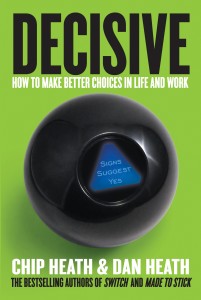 Tony: Oh, I’m glad you ask me this one. So I just got finished with the book Decisive. I think it’s called Decisive: Effective Decision Making or How to Make Effective Decisions. I know a lot of your past guests that you’re interviewed, everyone is like, “Just go for it” and “Believe in yourself.” Yeah, we make mistakes and I believe in all that. I do. But this book, Decisive, basically allows you to pinpoint your target a little bit more rather than just go on out like right now.
Tony: Oh, I’m glad you ask me this one. So I just got finished with the book Decisive. I think it’s called Decisive: Effective Decision Making or How to Make Effective Decisions. I know a lot of your past guests that you’re interviewed, everyone is like, “Just go for it” and “Believe in yourself.” Yeah, we make mistakes and I believe in all that. I do. But this book, Decisive, basically allows you to pinpoint your target a little bit more rather than just go on out like right now.
Hey, I work. I belong to the military. I own a house. I have a wife who loves me and I need to feed. I can’t just quit today because a have a whim. And this book Decisive, especially for military types or anybody that has any sort of responsibility or authority over anyone that are depending on them, this book Decisive really, really captures not just looking at this or that but maybe this and that to move that spotlight around and figure out options that I think sometimes us, as military folks, it’s either this way or that way and that’s it. It’s tradition.
And this book kind of begins to break some of those traditions that can hold us back. And it’s a good book. It’s a great book. It’s an easy read and it cites a lot of corporate companies that have succeeded and failed and explained clearly why they had. So I would definitely recommend that book.
John: Tony, love it. It’s not a book that I hear recommended often at all so thanks for bringing that little diversity to the table. And thank you overall for just being so open, so passionate, so inspiring today. And let’s end with you giving High Speed Nation one parting piece of guidance, sharing in the best way that we can connect with you and then we’ll say goodbye.
Tony: One parting piece of guidance. I believe what everyone else says: You need to discover your passion. And I’m talking to specifically the veteran right now. Things that you have trained in, things that you have done, things that you have seen affect you, whether good or bad, they affect you and sometimes those things that affect us may get in the way of things that we really care about. And I would encourage my veterans, I would encourage those that support the veterans that because of what you seen, done or been, discover your passion and pursue that passion with the intestinal fortitude that has been burned in all of us with the exception of maybe the Air Force.
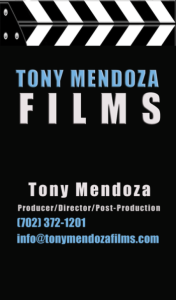 No, I’m kidding. Okay. But find that passion and pursue it with military response, with the military intestinal fortitude, with military aggression. And with that said, you will find success. And I’ve heard, again, people on your show, success ? How do you grade success? John, I have three rose bushes in my backyard. I get to smoke a cigar once every week or so when my wife lets me. I take a nice drink of Amaretto and I stare at my freaking roses and that’s what I do. I feel just good that I have rose plants now, that I can look at and think about and trim and enjoy time with my wife. That is success for me. So that’s what I would say to that.
No, I’m kidding. Okay. But find that passion and pursue it with military response, with the military intestinal fortitude, with military aggression. And with that said, you will find success. And I’ve heard, again, people on your show, success ? How do you grade success? John, I have three rose bushes in my backyard. I get to smoke a cigar once every week or so when my wife lets me. I take a nice drink of Amaretto and I stare at my freaking roses and that’s what I do. I feel just good that I have rose plants now, that I can look at and think about and trim and enjoy time with my wife. That is success for me. So that’s what I would say to that.
If you want to see more of what I’m doing in regards to film production, teaching different aspects of film and producing and things like that, the easiest way to see what I’m doing is just going to my website which is tonymendozafilms.com and that?s about it.
John: Well, High Speed Nation, you are the average of the five people that you spend the most time with and you have been hanging out with Tony and myself today so keep up the heat. And, Tony, thank you for being so generous with your time. I look forward to the day that I can smoke a cigar with you, staring at some rose bushes my friends. That would be a dream.
Tony: January, bro. Meet me at the expo.
John: Oh, there we go.
Tony: [0:30:05] [Indiscernible] cigars brother.
John: Okay, done, done and done. And, Tony, High Speed Nation salutes you. And we’ll catch you on the flip side.
Tony: Roger that. Seven out.
Veterans, your education doesn’t stop here. Go to highspeedelite.com to join the exclusive veterans’ mastermind that will give you the unfair advantage to succeed in both business and life. We have dozens of training courses, HD videos, a private Facebook group, and the chance to interact daily with John and other successful veteran entrepreneurs every month on live hangouts and webinars.
High Speed Elite is more than a mastermind. It’s your ticket to the land of success.
Are you prepared to ignite? Go to highspeedelite.com today to find out more.
